A Study on the Effects of Mobile Computing on Business Organizations
VerifiedAdded on 2020/05/11
|19
|3982
|464
Report
AI Summary
This research proposal investigates the impact of mobile computing on business operations, focusing on both the advantages and disadvantages of its implementation within Small and Medium Enterprises (SMEs) and Multinational Corporations (MNCs). The study begins with an introduction that highlights the increasing importance of mobile computing and its role in modern communication and information technology. The project objectives include identifying the major benefits of adopting mobile computing technologies, such as improved communication and data accessibility. The literature review covers various aspects of mobile computing, including the evolution of mobile devices, cloud computing, and the challenges related to data privacy and security. The research employs a mixed-methods approach, combining qualitative and quantitative research methods to collect and analyze primary and secondary data. The study aims to answer specific research questions, such as the challenges organizations face with mobile computing, its impact on workforce productivity, and the associated privacy and security risks. The proposal outlines the research design, methodology, and limitations, along with a detailed time schedule and references. The appendices include questionnaires and a Gantt chart to illustrate the research process.
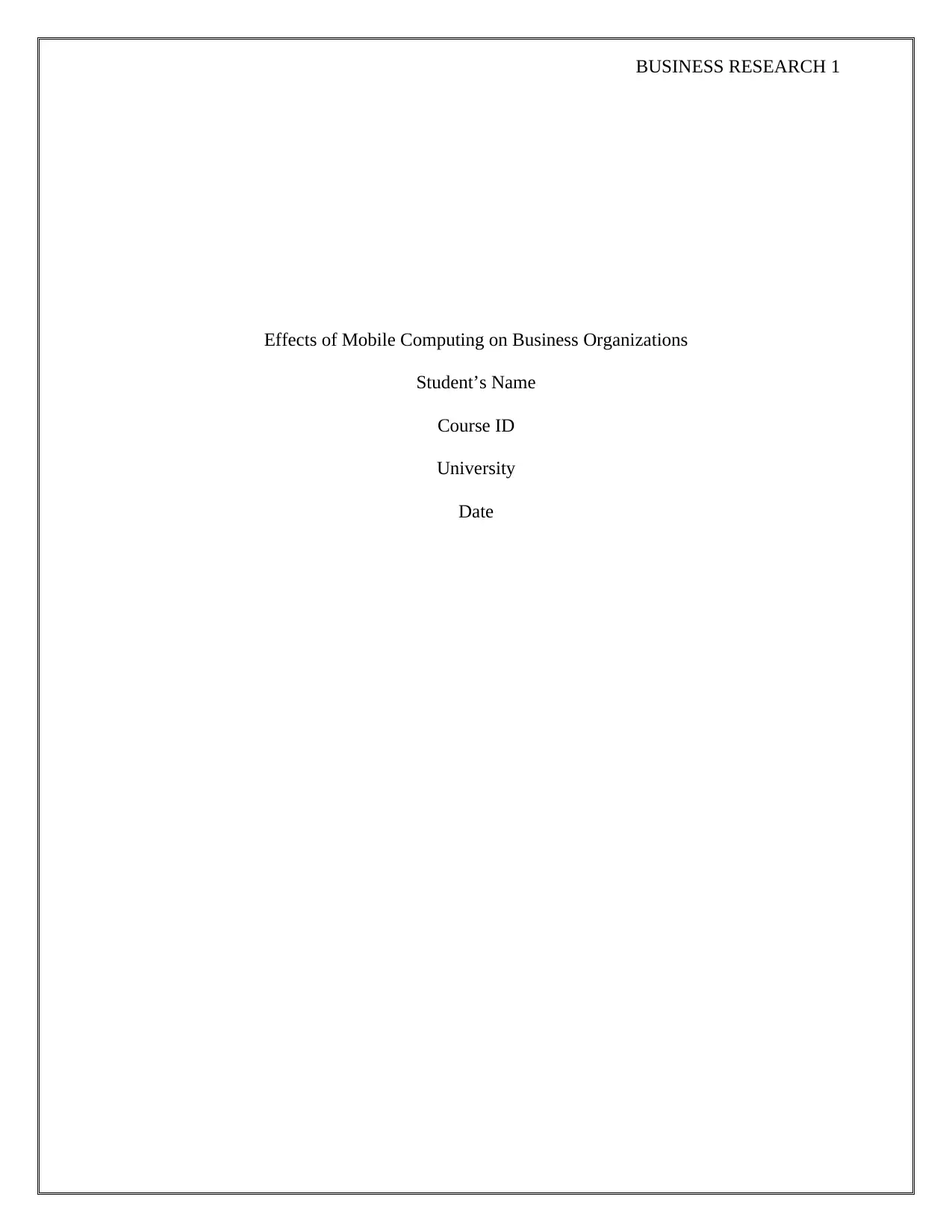
BUSINESS RESEARCH 1
Effects of Mobile Computing on Business Organizations
Student’s Name
Course ID
University
Date
Effects of Mobile Computing on Business Organizations
Student’s Name
Course ID
University
Date
Paraphrase This Document
Need a fresh take? Get an instant paraphrase of this document with our AI Paraphraser
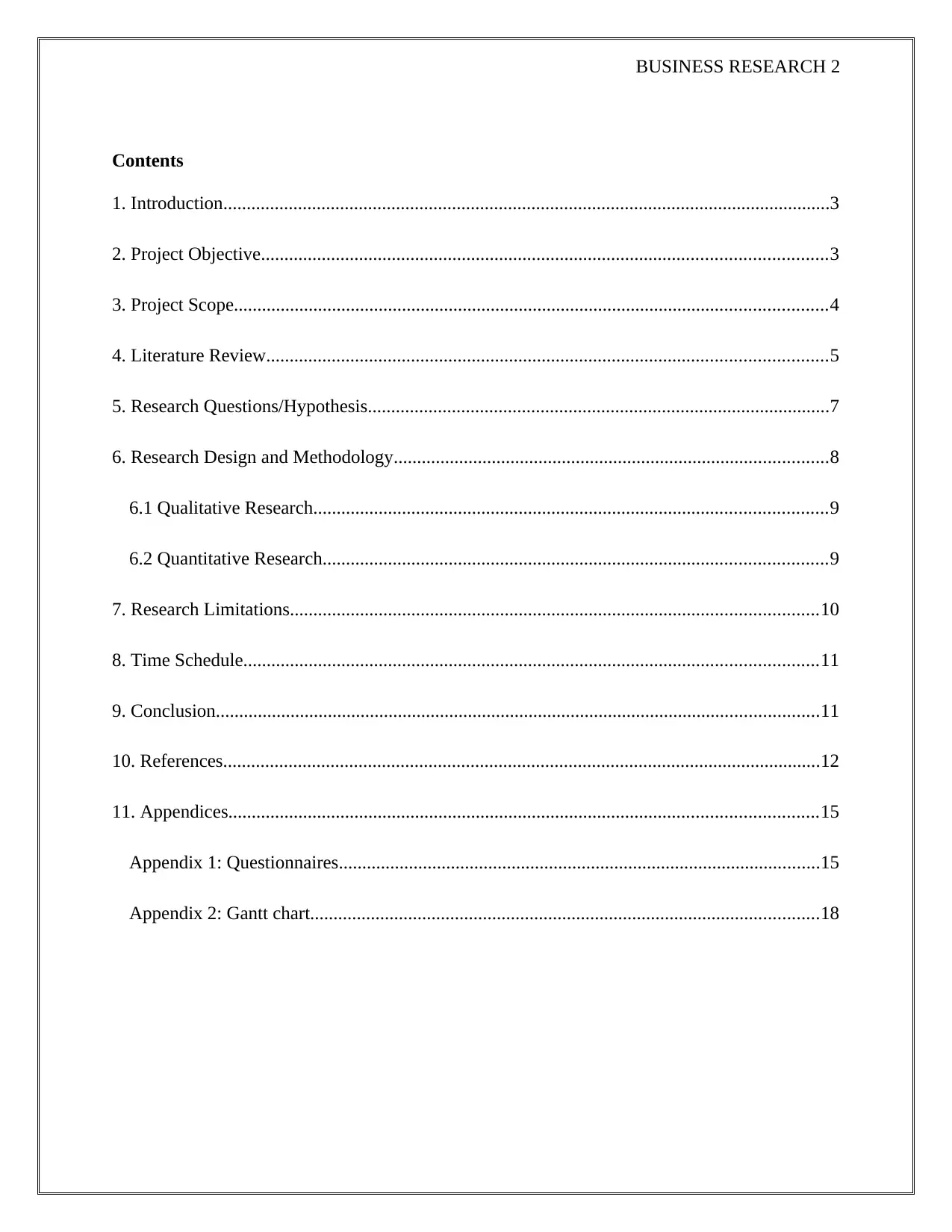
BUSINESS RESEARCH 2
Contents
1. Introduction..................................................................................................................................3
2. Project Objective.........................................................................................................................3
3. Project Scope...............................................................................................................................4
4. Literature Review........................................................................................................................5
5. Research Questions/Hypothesis...................................................................................................7
6. Research Design and Methodology.............................................................................................8
6.1 Qualitative Research..............................................................................................................9
6.2 Quantitative Research............................................................................................................9
7. Research Limitations.................................................................................................................10
8. Time Schedule...........................................................................................................................11
9. Conclusion.................................................................................................................................11
10. References................................................................................................................................12
11. Appendices..............................................................................................................................15
Appendix 1: Questionnaires.......................................................................................................15
Appendix 2: Gantt chart.............................................................................................................18
Contents
1. Introduction..................................................................................................................................3
2. Project Objective.........................................................................................................................3
3. Project Scope...............................................................................................................................4
4. Literature Review........................................................................................................................5
5. Research Questions/Hypothesis...................................................................................................7
6. Research Design and Methodology.............................................................................................8
6.1 Qualitative Research..............................................................................................................9
6.2 Quantitative Research............................................................................................................9
7. Research Limitations.................................................................................................................10
8. Time Schedule...........................................................................................................................11
9. Conclusion.................................................................................................................................11
10. References................................................................................................................................12
11. Appendices..............................................................................................................................15
Appendix 1: Questionnaires.......................................................................................................15
Appendix 2: Gantt chart.............................................................................................................18
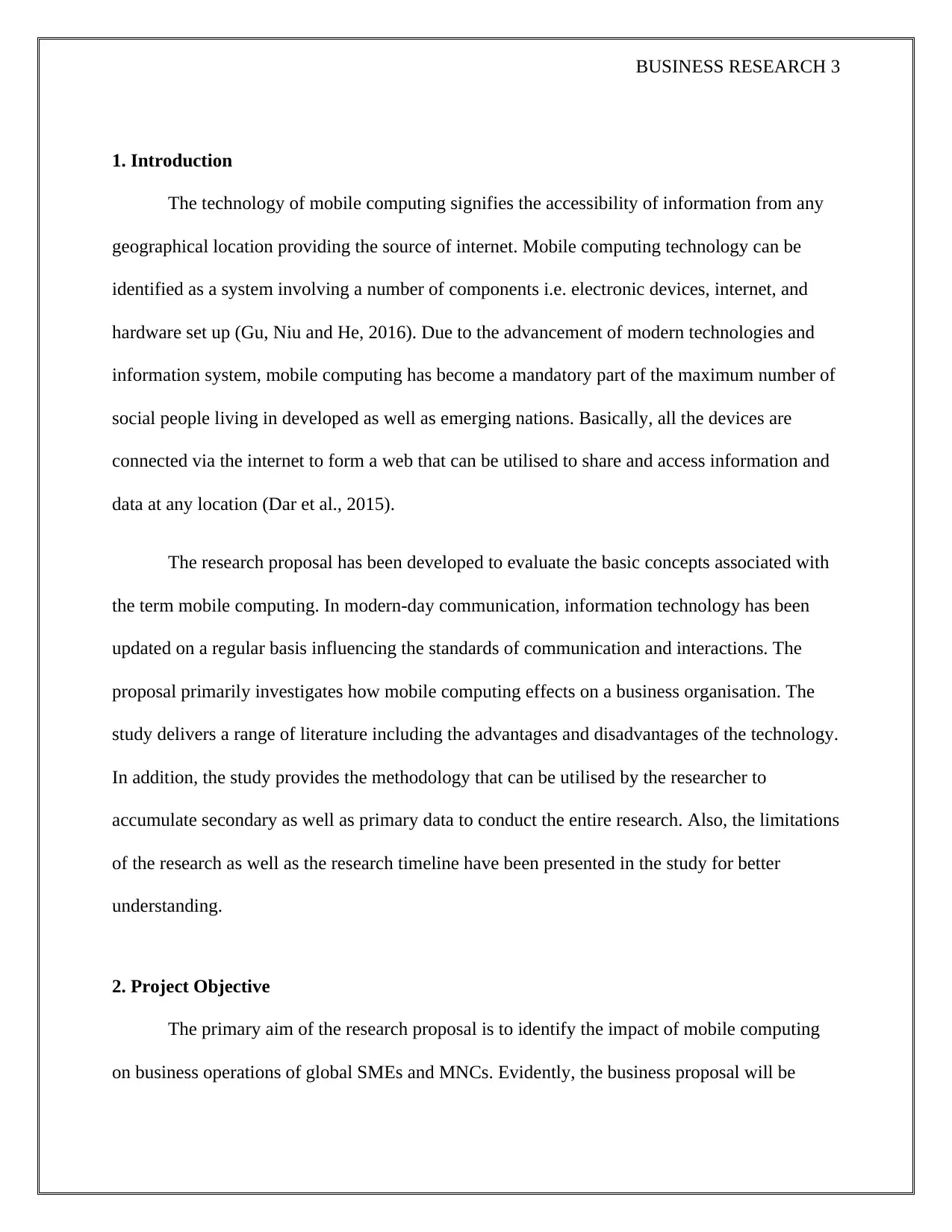
BUSINESS RESEARCH 3
1. Introduction
The technology of mobile computing signifies the accessibility of information from any
geographical location providing the source of internet. Mobile computing technology can be
identified as a system involving a number of components i.e. electronic devices, internet, and
hardware set up (Gu, Niu and He, 2016). Due to the advancement of modern technologies and
information system, mobile computing has become a mandatory part of the maximum number of
social people living in developed as well as emerging nations. Basically, all the devices are
connected via the internet to form a web that can be utilised to share and access information and
data at any location (Dar et al., 2015).
The research proposal has been developed to evaluate the basic concepts associated with
the term mobile computing. In modern-day communication, information technology has been
updated on a regular basis influencing the standards of communication and interactions. The
proposal primarily investigates how mobile computing effects on a business organisation. The
study delivers a range of literature including the advantages and disadvantages of the technology.
In addition, the study provides the methodology that can be utilised by the researcher to
accumulate secondary as well as primary data to conduct the entire research. Also, the limitations
of the research as well as the research timeline have been presented in the study for better
understanding.
2. Project Objective
The primary aim of the research proposal is to identify the impact of mobile computing
on business operations of global SMEs and MNCs. Evidently, the business proposal will be
1. Introduction
The technology of mobile computing signifies the accessibility of information from any
geographical location providing the source of internet. Mobile computing technology can be
identified as a system involving a number of components i.e. electronic devices, internet, and
hardware set up (Gu, Niu and He, 2016). Due to the advancement of modern technologies and
information system, mobile computing has become a mandatory part of the maximum number of
social people living in developed as well as emerging nations. Basically, all the devices are
connected via the internet to form a web that can be utilised to share and access information and
data at any location (Dar et al., 2015).
The research proposal has been developed to evaluate the basic concepts associated with
the term mobile computing. In modern-day communication, information technology has been
updated on a regular basis influencing the standards of communication and interactions. The
proposal primarily investigates how mobile computing effects on a business organisation. The
study delivers a range of literature including the advantages and disadvantages of the technology.
In addition, the study provides the methodology that can be utilised by the researcher to
accumulate secondary as well as primary data to conduct the entire research. Also, the limitations
of the research as well as the research timeline have been presented in the study for better
understanding.
2. Project Objective
The primary aim of the research proposal is to identify the impact of mobile computing
on business operations of global SMEs and MNCs. Evidently, the business proposal will be
⊘ This is a preview!⊘
Do you want full access?
Subscribe today to unlock all pages.

Trusted by 1+ million students worldwide
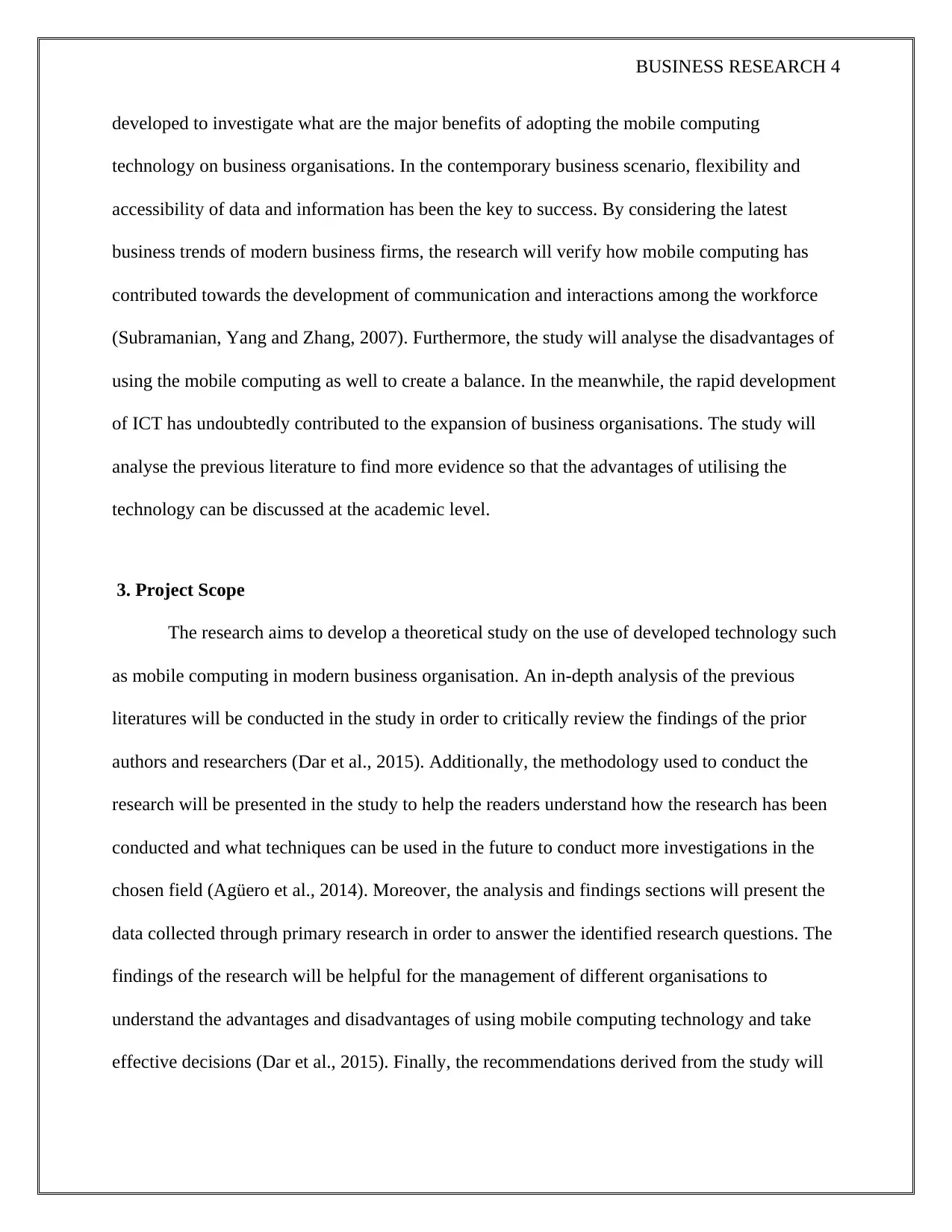
BUSINESS RESEARCH 4
developed to investigate what are the major benefits of adopting the mobile computing
technology on business organisations. In the contemporary business scenario, flexibility and
accessibility of data and information has been the key to success. By considering the latest
business trends of modern business firms, the research will verify how mobile computing has
contributed towards the development of communication and interactions among the workforce
(Subramanian, Yang and Zhang, 2007). Furthermore, the study will analyse the disadvantages of
using the mobile computing as well to create a balance. In the meanwhile, the rapid development
of ICT has undoubtedly contributed to the expansion of business organisations. The study will
analyse the previous literature to find more evidence so that the advantages of utilising the
technology can be discussed at the academic level.
3. Project Scope
The research aims to develop a theoretical study on the use of developed technology such
as mobile computing in modern business organisation. An in-depth analysis of the previous
literatures will be conducted in the study in order to critically review the findings of the prior
authors and researchers (Dar et al., 2015). Additionally, the methodology used to conduct the
research will be presented in the study to help the readers understand how the research has been
conducted and what techniques can be used in the future to conduct more investigations in the
chosen field (Agüero et al., 2014). Moreover, the analysis and findings sections will present the
data collected through primary research in order to answer the identified research questions. The
findings of the research will be helpful for the management of different organisations to
understand the advantages and disadvantages of using mobile computing technology and take
effective decisions (Dar et al., 2015). Finally, the recommendations derived from the study will
developed to investigate what are the major benefits of adopting the mobile computing
technology on business organisations. In the contemporary business scenario, flexibility and
accessibility of data and information has been the key to success. By considering the latest
business trends of modern business firms, the research will verify how mobile computing has
contributed towards the development of communication and interactions among the workforce
(Subramanian, Yang and Zhang, 2007). Furthermore, the study will analyse the disadvantages of
using the mobile computing as well to create a balance. In the meanwhile, the rapid development
of ICT has undoubtedly contributed to the expansion of business organisations. The study will
analyse the previous literature to find more evidence so that the advantages of utilising the
technology can be discussed at the academic level.
3. Project Scope
The research aims to develop a theoretical study on the use of developed technology such
as mobile computing in modern business organisation. An in-depth analysis of the previous
literatures will be conducted in the study in order to critically review the findings of the prior
authors and researchers (Dar et al., 2015). Additionally, the methodology used to conduct the
research will be presented in the study to help the readers understand how the research has been
conducted and what techniques can be used in the future to conduct more investigations in the
chosen field (Agüero et al., 2014). Moreover, the analysis and findings sections will present the
data collected through primary research in order to answer the identified research questions. The
findings of the research will be helpful for the management of different organisations to
understand the advantages and disadvantages of using mobile computing technology and take
effective decisions (Dar et al., 2015). Finally, the recommendations derived from the study will
Paraphrase This Document
Need a fresh take? Get an instant paraphrase of this document with our AI Paraphraser
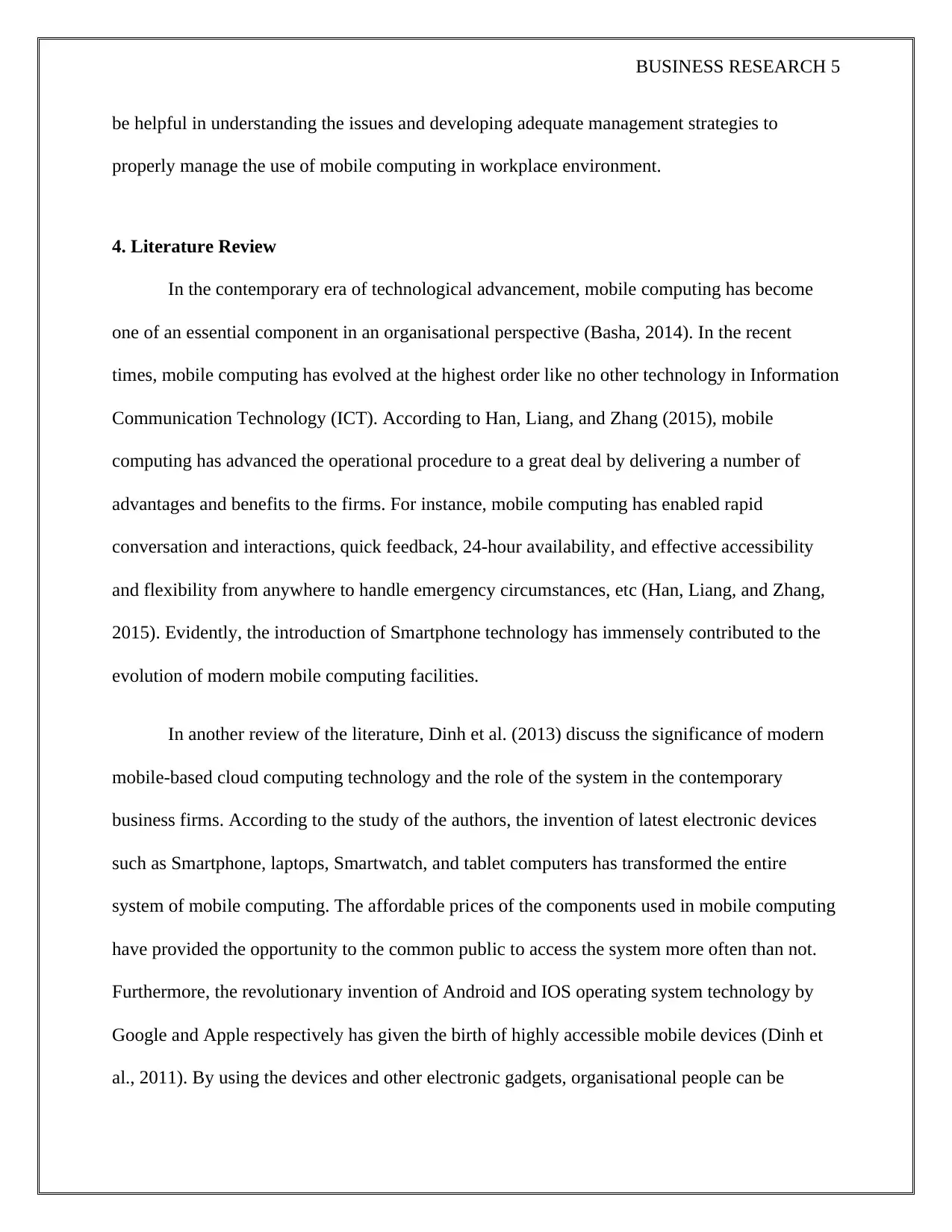
BUSINESS RESEARCH 5
be helpful in understanding the issues and developing adequate management strategies to
properly manage the use of mobile computing in workplace environment.
4. Literature Review
In the contemporary era of technological advancement, mobile computing has become
one of an essential component in an organisational perspective (Basha, 2014). In the recent
times, mobile computing has evolved at the highest order like no other technology in Information
Communication Technology (ICT). According to Han, Liang, and Zhang (2015), mobile
computing has advanced the operational procedure to a great deal by delivering a number of
advantages and benefits to the firms. For instance, mobile computing has enabled rapid
conversation and interactions, quick feedback, 24-hour availability, and effective accessibility
and flexibility from anywhere to handle emergency circumstances, etc (Han, Liang, and Zhang,
2015). Evidently, the introduction of Smartphone technology has immensely contributed to the
evolution of modern mobile computing facilities.
In another review of the literature, Dinh et al. (2013) discuss the significance of modern
mobile-based cloud computing technology and the role of the system in the contemporary
business firms. According to the study of the authors, the invention of latest electronic devices
such as Smartphone, laptops, Smartwatch, and tablet computers has transformed the entire
system of mobile computing. The affordable prices of the components used in mobile computing
have provided the opportunity to the common public to access the system more often than not.
Furthermore, the revolutionary invention of Android and IOS operating system technology by
Google and Apple respectively has given the birth of highly accessible mobile devices (Dinh et
al., 2011). By using the devices and other electronic gadgets, organisational people can be
be helpful in understanding the issues and developing adequate management strategies to
properly manage the use of mobile computing in workplace environment.
4. Literature Review
In the contemporary era of technological advancement, mobile computing has become
one of an essential component in an organisational perspective (Basha, 2014). In the recent
times, mobile computing has evolved at the highest order like no other technology in Information
Communication Technology (ICT). According to Han, Liang, and Zhang (2015), mobile
computing has advanced the operational procedure to a great deal by delivering a number of
advantages and benefits to the firms. For instance, mobile computing has enabled rapid
conversation and interactions, quick feedback, 24-hour availability, and effective accessibility
and flexibility from anywhere to handle emergency circumstances, etc (Han, Liang, and Zhang,
2015). Evidently, the introduction of Smartphone technology has immensely contributed to the
evolution of modern mobile computing facilities.
In another review of the literature, Dinh et al. (2013) discuss the significance of modern
mobile-based cloud computing technology and the role of the system in the contemporary
business firms. According to the study of the authors, the invention of latest electronic devices
such as Smartphone, laptops, Smartwatch, and tablet computers has transformed the entire
system of mobile computing. The affordable prices of the components used in mobile computing
have provided the opportunity to the common public to access the system more often than not.
Furthermore, the revolutionary invention of Android and IOS operating system technology by
Google and Apple respectively has given the birth of highly accessible mobile devices (Dinh et
al., 2011). By using the devices and other electronic gadgets, organisational people can be
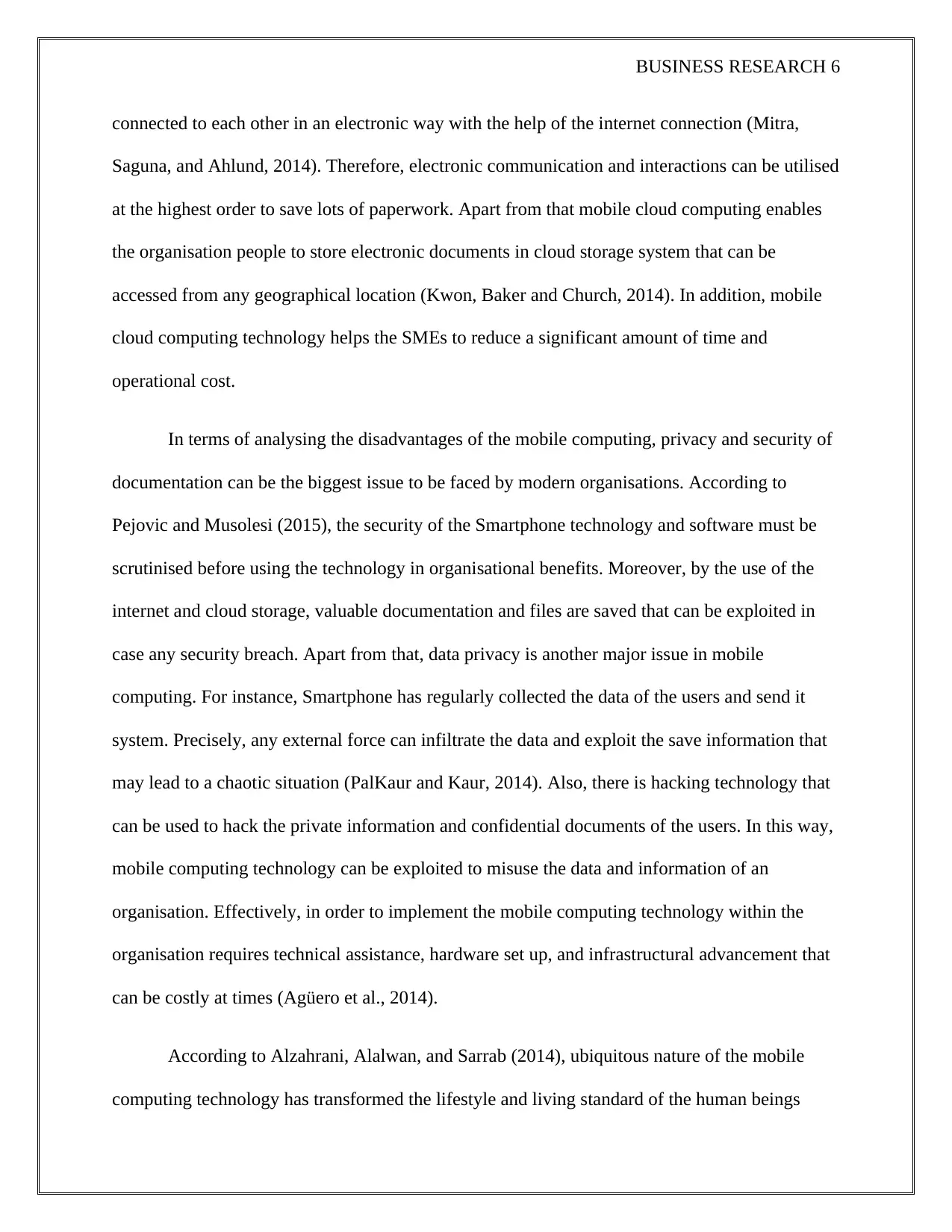
BUSINESS RESEARCH 6
connected to each other in an electronic way with the help of the internet connection (Mitra,
Saguna, and Ahlund, 2014). Therefore, electronic communication and interactions can be utilised
at the highest order to save lots of paperwork. Apart from that mobile cloud computing enables
the organisation people to store electronic documents in cloud storage system that can be
accessed from any geographical location (Kwon, Baker and Church, 2014). In addition, mobile
cloud computing technology helps the SMEs to reduce a significant amount of time and
operational cost.
In terms of analysing the disadvantages of the mobile computing, privacy and security of
documentation can be the biggest issue to be faced by modern organisations. According to
Pejovic and Musolesi (2015), the security of the Smartphone technology and software must be
scrutinised before using the technology in organisational benefits. Moreover, by the use of the
internet and cloud storage, valuable documentation and files are saved that can be exploited in
case any security breach. Apart from that, data privacy is another major issue in mobile
computing. For instance, Smartphone has regularly collected the data of the users and send it
system. Precisely, any external force can infiltrate the data and exploit the save information that
may lead to a chaotic situation (PalKaur and Kaur, 2014). Also, there is hacking technology that
can be used to hack the private information and confidential documents of the users. In this way,
mobile computing technology can be exploited to misuse the data and information of an
organisation. Effectively, in order to implement the mobile computing technology within the
organisation requires technical assistance, hardware set up, and infrastructural advancement that
can be costly at times (Agüero et al., 2014).
According to Alzahrani, Alalwan, and Sarrab (2014), ubiquitous nature of the mobile
computing technology has transformed the lifestyle and living standard of the human beings
connected to each other in an electronic way with the help of the internet connection (Mitra,
Saguna, and Ahlund, 2014). Therefore, electronic communication and interactions can be utilised
at the highest order to save lots of paperwork. Apart from that mobile cloud computing enables
the organisation people to store electronic documents in cloud storage system that can be
accessed from any geographical location (Kwon, Baker and Church, 2014). In addition, mobile
cloud computing technology helps the SMEs to reduce a significant amount of time and
operational cost.
In terms of analysing the disadvantages of the mobile computing, privacy and security of
documentation can be the biggest issue to be faced by modern organisations. According to
Pejovic and Musolesi (2015), the security of the Smartphone technology and software must be
scrutinised before using the technology in organisational benefits. Moreover, by the use of the
internet and cloud storage, valuable documentation and files are saved that can be exploited in
case any security breach. Apart from that, data privacy is another major issue in mobile
computing. For instance, Smartphone has regularly collected the data of the users and send it
system. Precisely, any external force can infiltrate the data and exploit the save information that
may lead to a chaotic situation (PalKaur and Kaur, 2014). Also, there is hacking technology that
can be used to hack the private information and confidential documents of the users. In this way,
mobile computing technology can be exploited to misuse the data and information of an
organisation. Effectively, in order to implement the mobile computing technology within the
organisation requires technical assistance, hardware set up, and infrastructural advancement that
can be costly at times (Agüero et al., 2014).
According to Alzahrani, Alalwan, and Sarrab (2014), ubiquitous nature of the mobile
computing technology has transformed the lifestyle and living standard of the human beings
⊘ This is a preview!⊘
Do you want full access?
Subscribe today to unlock all pages.

Trusted by 1+ million students worldwide
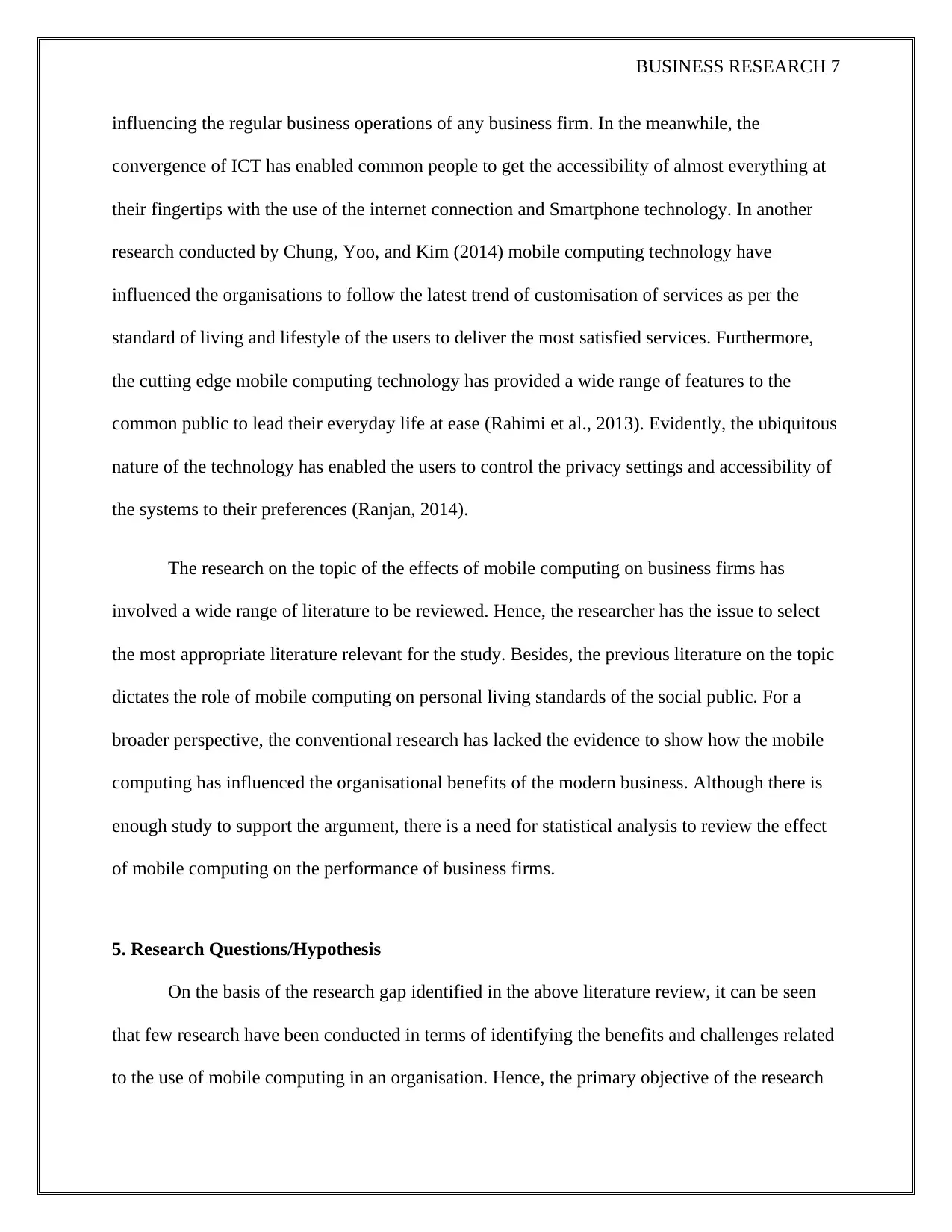
BUSINESS RESEARCH 7
influencing the regular business operations of any business firm. In the meanwhile, the
convergence of ICT has enabled common people to get the accessibility of almost everything at
their fingertips with the use of the internet connection and Smartphone technology. In another
research conducted by Chung, Yoo, and Kim (2014) mobile computing technology have
influenced the organisations to follow the latest trend of customisation of services as per the
standard of living and lifestyle of the users to deliver the most satisfied services. Furthermore,
the cutting edge mobile computing technology has provided a wide range of features to the
common public to lead their everyday life at ease (Rahimi et al., 2013). Evidently, the ubiquitous
nature of the technology has enabled the users to control the privacy settings and accessibility of
the systems to their preferences (Ranjan, 2014).
The research on the topic of the effects of mobile computing on business firms has
involved a wide range of literature to be reviewed. Hence, the researcher has the issue to select
the most appropriate literature relevant for the study. Besides, the previous literature on the topic
dictates the role of mobile computing on personal living standards of the social public. For a
broader perspective, the conventional research has lacked the evidence to show how the mobile
computing has influenced the organisational benefits of the modern business. Although there is
enough study to support the argument, there is a need for statistical analysis to review the effect
of mobile computing on the performance of business firms.
5. Research Questions/Hypothesis
On the basis of the research gap identified in the above literature review, it can be seen
that few research have been conducted in terms of identifying the benefits and challenges related
to the use of mobile computing in an organisation. Hence, the primary objective of the research
influencing the regular business operations of any business firm. In the meanwhile, the
convergence of ICT has enabled common people to get the accessibility of almost everything at
their fingertips with the use of the internet connection and Smartphone technology. In another
research conducted by Chung, Yoo, and Kim (2014) mobile computing technology have
influenced the organisations to follow the latest trend of customisation of services as per the
standard of living and lifestyle of the users to deliver the most satisfied services. Furthermore,
the cutting edge mobile computing technology has provided a wide range of features to the
common public to lead their everyday life at ease (Rahimi et al., 2013). Evidently, the ubiquitous
nature of the technology has enabled the users to control the privacy settings and accessibility of
the systems to their preferences (Ranjan, 2014).
The research on the topic of the effects of mobile computing on business firms has
involved a wide range of literature to be reviewed. Hence, the researcher has the issue to select
the most appropriate literature relevant for the study. Besides, the previous literature on the topic
dictates the role of mobile computing on personal living standards of the social public. For a
broader perspective, the conventional research has lacked the evidence to show how the mobile
computing has influenced the organisational benefits of the modern business. Although there is
enough study to support the argument, there is a need for statistical analysis to review the effect
of mobile computing on the performance of business firms.
5. Research Questions/Hypothesis
On the basis of the research gap identified in the above literature review, it can be seen
that few research have been conducted in terms of identifying the benefits and challenges related
to the use of mobile computing in an organisation. Hence, the primary objective of the research
Paraphrase This Document
Need a fresh take? Get an instant paraphrase of this document with our AI Paraphraser
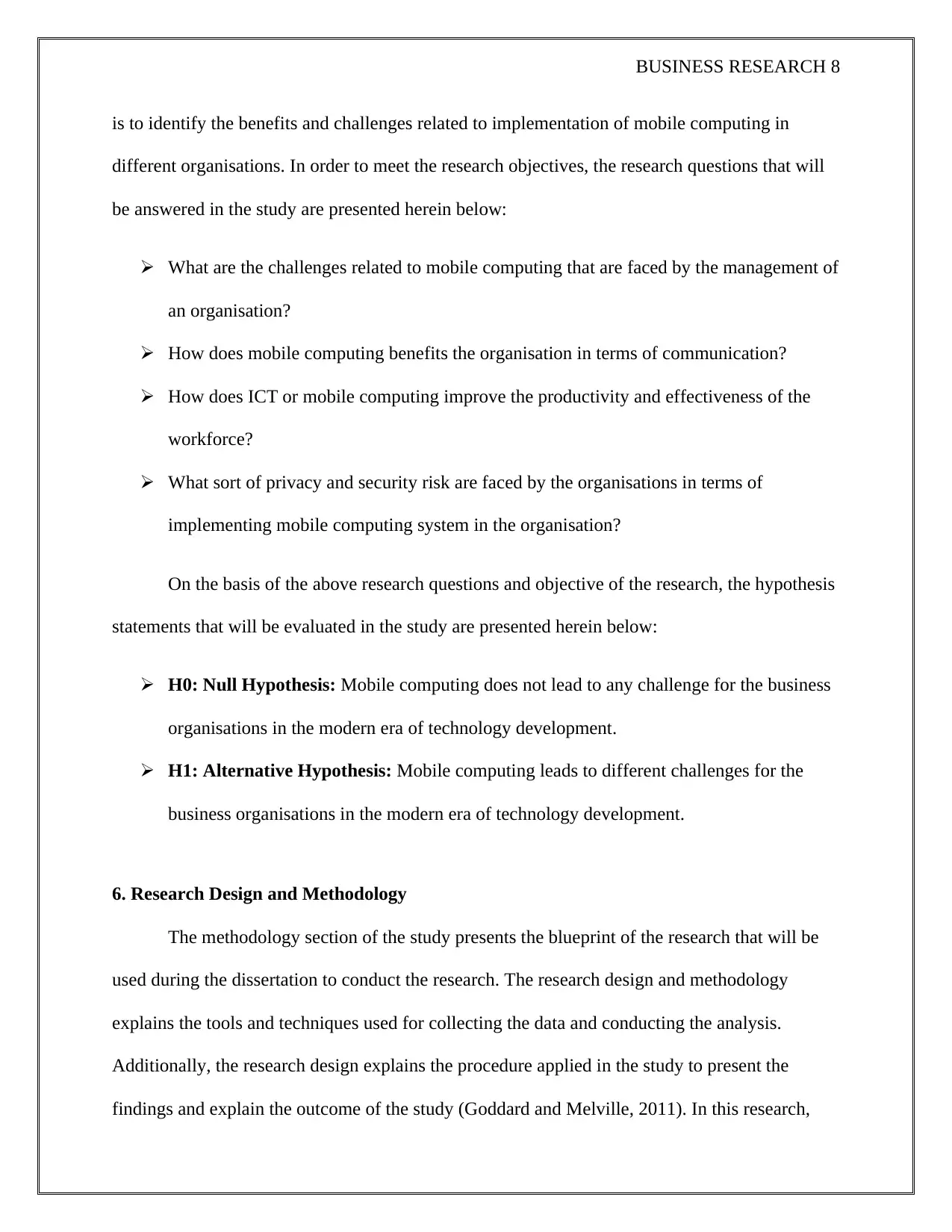
BUSINESS RESEARCH 8
is to identify the benefits and challenges related to implementation of mobile computing in
different organisations. In order to meet the research objectives, the research questions that will
be answered in the study are presented herein below:
What are the challenges related to mobile computing that are faced by the management of
an organisation?
How does mobile computing benefits the organisation in terms of communication?
How does ICT or mobile computing improve the productivity and effectiveness of the
workforce?
What sort of privacy and security risk are faced by the organisations in terms of
implementing mobile computing system in the organisation?
On the basis of the above research questions and objective of the research, the hypothesis
statements that will be evaluated in the study are presented herein below:
H0: Null Hypothesis: Mobile computing does not lead to any challenge for the business
organisations in the modern era of technology development.
H1: Alternative Hypothesis: Mobile computing leads to different challenges for the
business organisations in the modern era of technology development.
6. Research Design and Methodology
The methodology section of the study presents the blueprint of the research that will be
used during the dissertation to conduct the research. The research design and methodology
explains the tools and techniques used for collecting the data and conducting the analysis.
Additionally, the research design explains the procedure applied in the study to present the
findings and explain the outcome of the study (Goddard and Melville, 2011). In this research,
is to identify the benefits and challenges related to implementation of mobile computing in
different organisations. In order to meet the research objectives, the research questions that will
be answered in the study are presented herein below:
What are the challenges related to mobile computing that are faced by the management of
an organisation?
How does mobile computing benefits the organisation in terms of communication?
How does ICT or mobile computing improve the productivity and effectiveness of the
workforce?
What sort of privacy and security risk are faced by the organisations in terms of
implementing mobile computing system in the organisation?
On the basis of the above research questions and objective of the research, the hypothesis
statements that will be evaluated in the study are presented herein below:
H0: Null Hypothesis: Mobile computing does not lead to any challenge for the business
organisations in the modern era of technology development.
H1: Alternative Hypothesis: Mobile computing leads to different challenges for the
business organisations in the modern era of technology development.
6. Research Design and Methodology
The methodology section of the study presents the blueprint of the research that will be
used during the dissertation to conduct the research. The research design and methodology
explains the tools and techniques used for collecting the data and conducting the analysis.
Additionally, the research design explains the procedure applied in the study to present the
findings and explain the outcome of the study (Goddard and Melville, 2011). In this research,
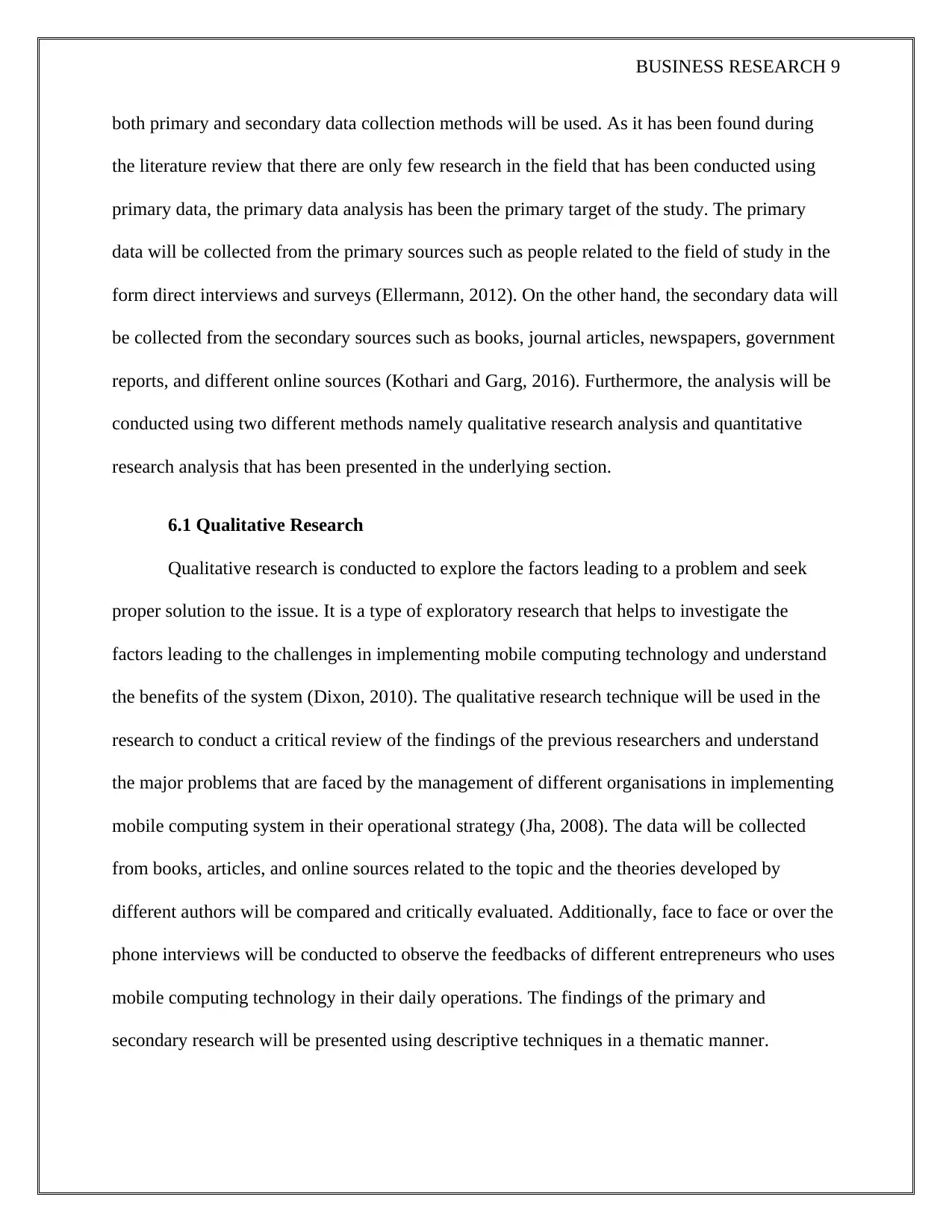
BUSINESS RESEARCH 9
both primary and secondary data collection methods will be used. As it has been found during
the literature review that there are only few research in the field that has been conducted using
primary data, the primary data analysis has been the primary target of the study. The primary
data will be collected from the primary sources such as people related to the field of study in the
form direct interviews and surveys (Ellermann, 2012). On the other hand, the secondary data will
be collected from the secondary sources such as books, journal articles, newspapers, government
reports, and different online sources (Kothari and Garg, 2016). Furthermore, the analysis will be
conducted using two different methods namely qualitative research analysis and quantitative
research analysis that has been presented in the underlying section.
6.1 Qualitative Research
Qualitative research is conducted to explore the factors leading to a problem and seek
proper solution to the issue. It is a type of exploratory research that helps to investigate the
factors leading to the challenges in implementing mobile computing technology and understand
the benefits of the system (Dixon, 2010). The qualitative research technique will be used in the
research to conduct a critical review of the findings of the previous researchers and understand
the major problems that are faced by the management of different organisations in implementing
mobile computing system in their operational strategy (Jha, 2008). The data will be collected
from books, articles, and online sources related to the topic and the theories developed by
different authors will be compared and critically evaluated. Additionally, face to face or over the
phone interviews will be conducted to observe the feedbacks of different entrepreneurs who uses
mobile computing technology in their daily operations. The findings of the primary and
secondary research will be presented using descriptive techniques in a thematic manner.
both primary and secondary data collection methods will be used. As it has been found during
the literature review that there are only few research in the field that has been conducted using
primary data, the primary data analysis has been the primary target of the study. The primary
data will be collected from the primary sources such as people related to the field of study in the
form direct interviews and surveys (Ellermann, 2012). On the other hand, the secondary data will
be collected from the secondary sources such as books, journal articles, newspapers, government
reports, and different online sources (Kothari and Garg, 2016). Furthermore, the analysis will be
conducted using two different methods namely qualitative research analysis and quantitative
research analysis that has been presented in the underlying section.
6.1 Qualitative Research
Qualitative research is conducted to explore the factors leading to a problem and seek
proper solution to the issue. It is a type of exploratory research that helps to investigate the
factors leading to the challenges in implementing mobile computing technology and understand
the benefits of the system (Dixon, 2010). The qualitative research technique will be used in the
research to conduct a critical review of the findings of the previous researchers and understand
the major problems that are faced by the management of different organisations in implementing
mobile computing system in their operational strategy (Jha, 2008). The data will be collected
from books, articles, and online sources related to the topic and the theories developed by
different authors will be compared and critically evaluated. Additionally, face to face or over the
phone interviews will be conducted to observe the feedbacks of different entrepreneurs who uses
mobile computing technology in their daily operations. The findings of the primary and
secondary research will be presented using descriptive techniques in a thematic manner.
⊘ This is a preview!⊘
Do you want full access?
Subscribe today to unlock all pages.

Trusted by 1+ million students worldwide
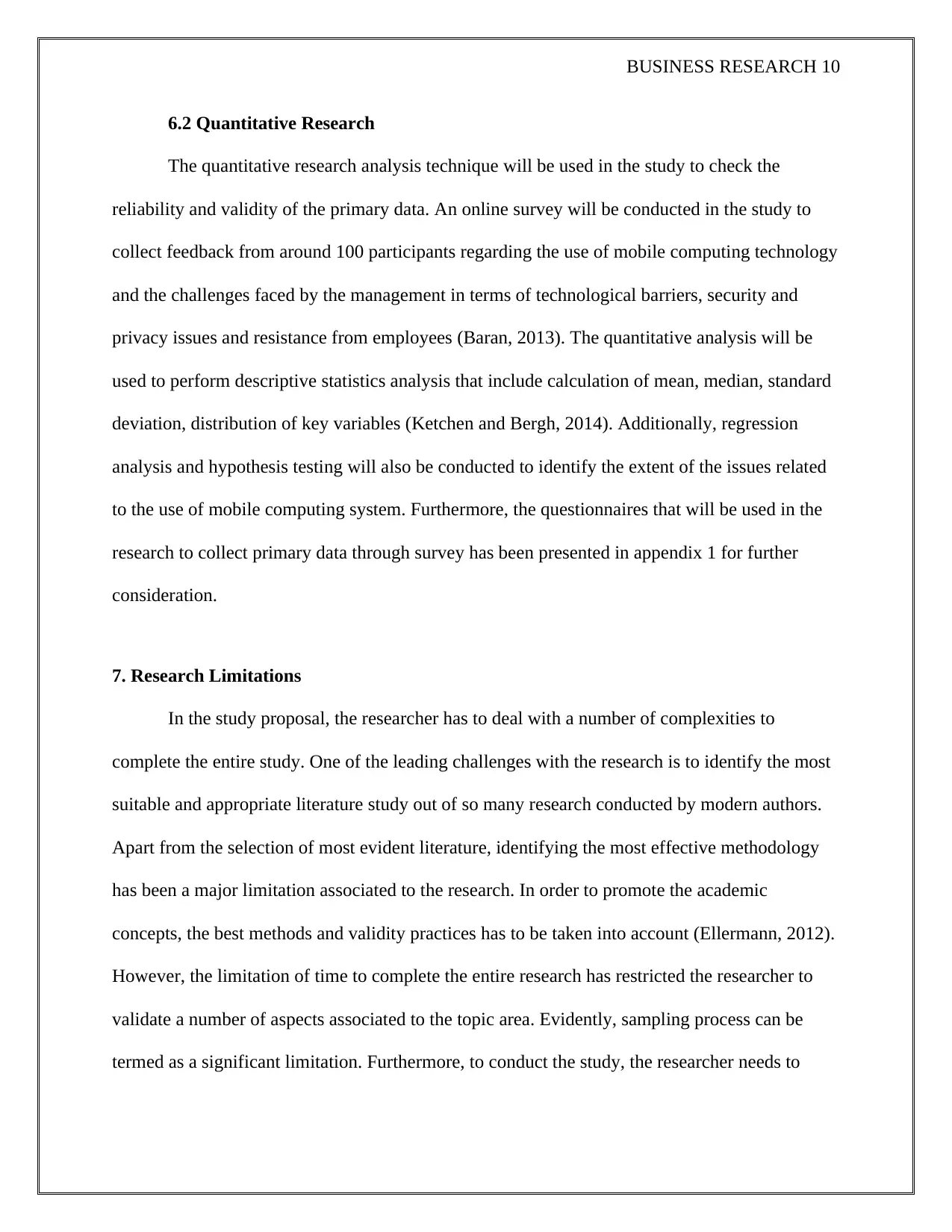
BUSINESS RESEARCH 10
6.2 Quantitative Research
The quantitative research analysis technique will be used in the study to check the
reliability and validity of the primary data. An online survey will be conducted in the study to
collect feedback from around 100 participants regarding the use of mobile computing technology
and the challenges faced by the management in terms of technological barriers, security and
privacy issues and resistance from employees (Baran, 2013). The quantitative analysis will be
used to perform descriptive statistics analysis that include calculation of mean, median, standard
deviation, distribution of key variables (Ketchen and Bergh, 2014). Additionally, regression
analysis and hypothesis testing will also be conducted to identify the extent of the issues related
to the use of mobile computing system. Furthermore, the questionnaires that will be used in the
research to collect primary data through survey has been presented in appendix 1 for further
consideration.
7. Research Limitations
In the study proposal, the researcher has to deal with a number of complexities to
complete the entire study. One of the leading challenges with the research is to identify the most
suitable and appropriate literature study out of so many research conducted by modern authors.
Apart from the selection of most evident literature, identifying the most effective methodology
has been a major limitation associated to the research. In order to promote the academic
concepts, the best methods and validity practices has to be taken into account (Ellermann, 2012).
However, the limitation of time to complete the entire research has restricted the researcher to
validate a number of aspects associated to the topic area. Evidently, sampling process can be
termed as a significant limitation. Furthermore, to conduct the study, the researcher needs to
6.2 Quantitative Research
The quantitative research analysis technique will be used in the study to check the
reliability and validity of the primary data. An online survey will be conducted in the study to
collect feedback from around 100 participants regarding the use of mobile computing technology
and the challenges faced by the management in terms of technological barriers, security and
privacy issues and resistance from employees (Baran, 2013). The quantitative analysis will be
used to perform descriptive statistics analysis that include calculation of mean, median, standard
deviation, distribution of key variables (Ketchen and Bergh, 2014). Additionally, regression
analysis and hypothesis testing will also be conducted to identify the extent of the issues related
to the use of mobile computing system. Furthermore, the questionnaires that will be used in the
research to collect primary data through survey has been presented in appendix 1 for further
consideration.
7. Research Limitations
In the study proposal, the researcher has to deal with a number of complexities to
complete the entire study. One of the leading challenges with the research is to identify the most
suitable and appropriate literature study out of so many research conducted by modern authors.
Apart from the selection of most evident literature, identifying the most effective methodology
has been a major limitation associated to the research. In order to promote the academic
concepts, the best methods and validity practices has to be taken into account (Ellermann, 2012).
However, the limitation of time to complete the entire research has restricted the researcher to
validate a number of aspects associated to the topic area. Evidently, sampling process can be
termed as a significant limitation. Furthermore, to conduct the study, the researcher needs to
Paraphrase This Document
Need a fresh take? Get an instant paraphrase of this document with our AI Paraphraser
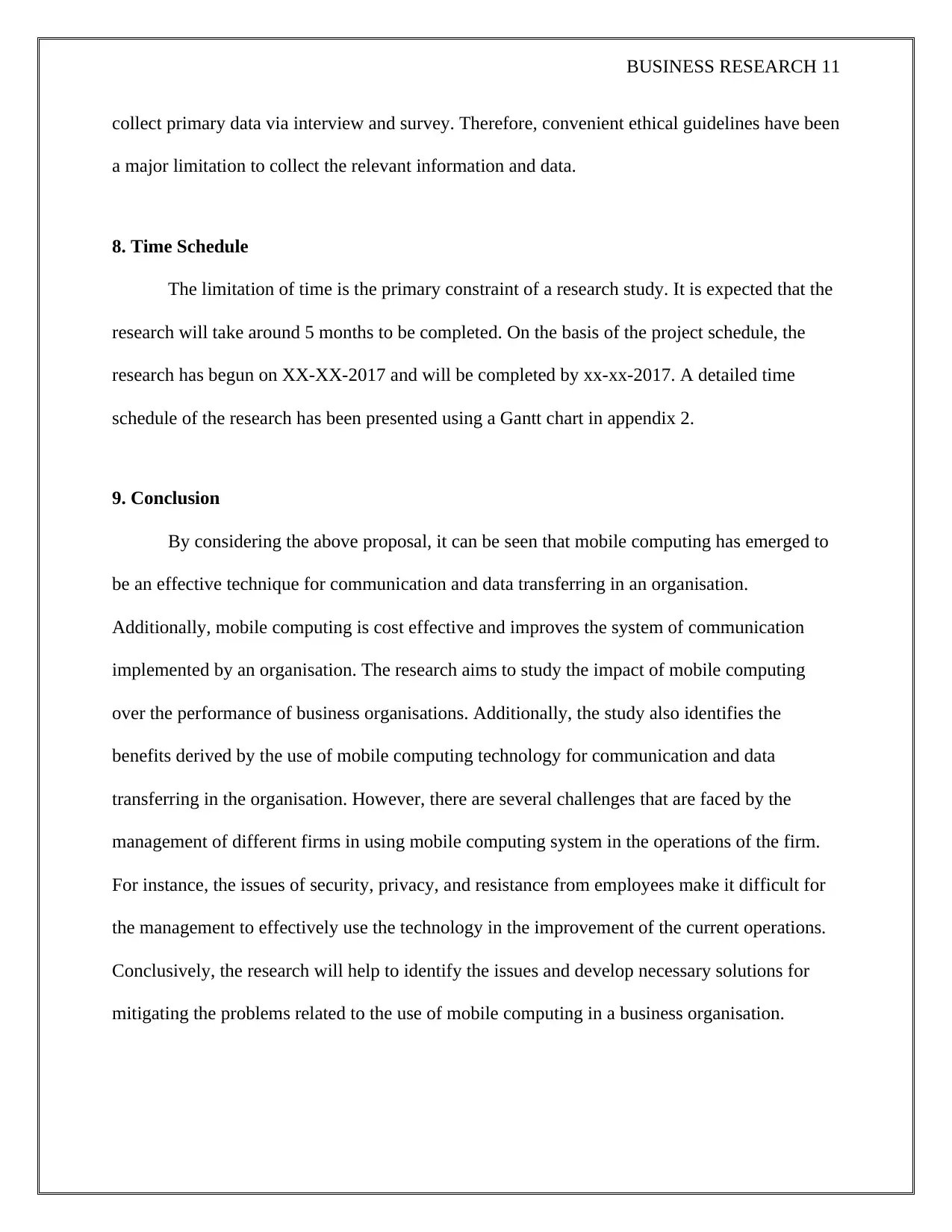
BUSINESS RESEARCH 11
collect primary data via interview and survey. Therefore, convenient ethical guidelines have been
a major limitation to collect the relevant information and data.
8. Time Schedule
The limitation of time is the primary constraint of a research study. It is expected that the
research will take around 5 months to be completed. On the basis of the project schedule, the
research has begun on XX-XX-2017 and will be completed by xx-xx-2017. A detailed time
schedule of the research has been presented using a Gantt chart in appendix 2.
9. Conclusion
By considering the above proposal, it can be seen that mobile computing has emerged to
be an effective technique for communication and data transferring in an organisation.
Additionally, mobile computing is cost effective and improves the system of communication
implemented by an organisation. The research aims to study the impact of mobile computing
over the performance of business organisations. Additionally, the study also identifies the
benefits derived by the use of mobile computing technology for communication and data
transferring in the organisation. However, there are several challenges that are faced by the
management of different firms in using mobile computing system in the operations of the firm.
For instance, the issues of security, privacy, and resistance from employees make it difficult for
the management to effectively use the technology in the improvement of the current operations.
Conclusively, the research will help to identify the issues and develop necessary solutions for
mitigating the problems related to the use of mobile computing in a business organisation.
collect primary data via interview and survey. Therefore, convenient ethical guidelines have been
a major limitation to collect the relevant information and data.
8. Time Schedule
The limitation of time is the primary constraint of a research study. It is expected that the
research will take around 5 months to be completed. On the basis of the project schedule, the
research has begun on XX-XX-2017 and will be completed by xx-xx-2017. A detailed time
schedule of the research has been presented using a Gantt chart in appendix 2.
9. Conclusion
By considering the above proposal, it can be seen that mobile computing has emerged to
be an effective technique for communication and data transferring in an organisation.
Additionally, mobile computing is cost effective and improves the system of communication
implemented by an organisation. The research aims to study the impact of mobile computing
over the performance of business organisations. Additionally, the study also identifies the
benefits derived by the use of mobile computing technology for communication and data
transferring in the organisation. However, there are several challenges that are faced by the
management of different firms in using mobile computing system in the operations of the firm.
For instance, the issues of security, privacy, and resistance from employees make it difficult for
the management to effectively use the technology in the improvement of the current operations.
Conclusively, the research will help to identify the issues and develop necessary solutions for
mitigating the problems related to the use of mobile computing in a business organisation.

BUSINESS RESEARCH 12
⊘ This is a preview!⊘
Do you want full access?
Subscribe today to unlock all pages.

Trusted by 1+ million students worldwide
1 out of 19
Related Documents
Your All-in-One AI-Powered Toolkit for Academic Success.
+13062052269
info@desklib.com
Available 24*7 on WhatsApp / Email
![[object Object]](/_next/static/media/star-bottom.7253800d.svg)
Unlock your academic potential
Copyright © 2020–2026 A2Z Services. All Rights Reserved. Developed and managed by ZUCOL.





